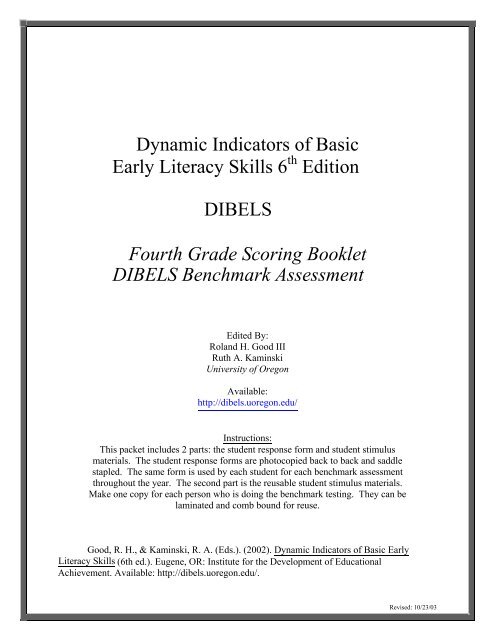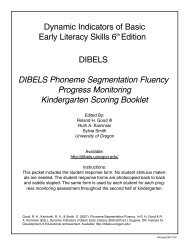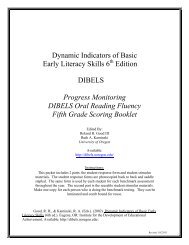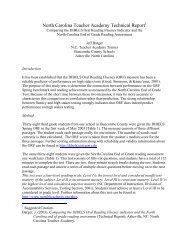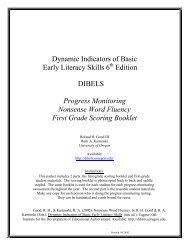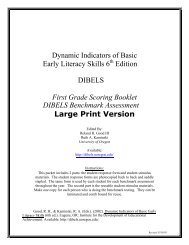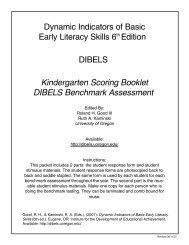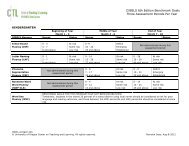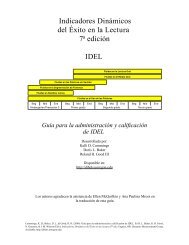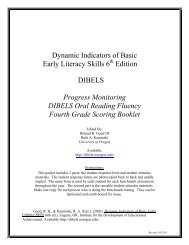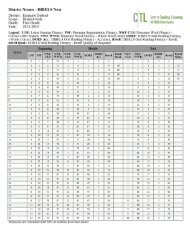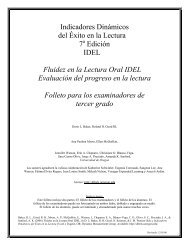Fourth Grade Scoring Booklet - Dibels - University of Oregon
Fourth Grade Scoring Booklet - Dibels - University of Oregon
Fourth Grade Scoring Booklet - Dibels - University of Oregon
You also want an ePaper? Increase the reach of your titles
YUMPU automatically turns print PDFs into web optimized ePapers that Google loves.
Benchmark 1.1DIBELS Oral Reading FluencyThe Water CycleIt is amazing to think that a dinosaur might have stepped inthe water you drank last night. That is because the water you useto drink, shower, or swim in is very old. The earth has a fixedamount <strong>of</strong> water that keeps going around and around in what isknown as the water cycle.The water cycle has four main phases. The first phase iscalled evaporation. This occurs when the sun heats up the waterin rivers, lakes, and oceans. The heat turns some <strong>of</strong> the waterinto vapor, or steam. At that point, the water is said to evaporate,as it becomes part <strong>of</strong> the air.The next phase <strong>of</strong> the water cycle is called condensation.Water vapor in the air becomes cold, which causes it to changeback into liquid form. The drops <strong>of</strong> water come together andform clouds. When the water becomes so heavy that the aircannot hold it any more, the next phase occurs.In the phase <strong>of</strong> the water cycle called precipitation, darkclouds release their water, and it falls back to the earth. In warmweather, clouds release water in the form <strong>of</strong> rain or hail. When itis cold, water falls as snow or sleet. The rain, hail, snow, or sleetfalls on land as well as on rivers, lakes, and oceans. This beginsthe final phase <strong>of</strong> the water cycle, called collection.When water falls on land, the earth collects it. The watermight run along the ground, where plants and animals may drinkit. It might flow into rivers, streams, or lakes. Or the water mightsoak deep into the earth and become groundwater. Groundwater1225395156677890103110120132143154163173186199213226235246257270279Page 2 © 2003, 2003 Dynamic Measurement Group, Inc.Benchmark 3.3 (Continued)DIBELS Oral Reading FluencyShe Reached for the Stars (Continued)eventually became a pr<strong>of</strong>essor <strong>of</strong> astronomy at Vassar College 255where she continued teaching and researching until the end <strong>of</strong> 265her life.267Maria Mitchell served as an example to women around the 277world. She inspired many young women to seek careers in 287science. As she said, “We especially need imagination in296science. It is not all mathematics, nor all logic, but is somewhat 308beauty and poetry.”311ORF Total:_________Retell:⊗ ● ● ● ● ● ● ● ● ●*● ● ● ● ● ● ● ● ●*● ● ● ● ● ● ● ● ●* 30⊗ ● ● ● ● ● ● ● ● ●*● ● ● ● ● ● ● ● ●*● ● ● ● ● ● ● ● ●* 60⊗ ● ● ● ● ● ● ● ● ●*● ● ● ● ● ● ● ● ●*● ● ● ● ● ● ● ● ●* 90⊗ ● ● ● ● ● ● ● ● ●*● ● ● ● ● ● ● ● ●*● ● ● ● ● ● ● ● ●* 120⊗ ● ● ● ● ● ● ● ● ●*● ● ● ● ● ● ● ● ●*● ● ● ● ● ● ● ● ●* 150⊗ ● ● ● ● ● ● ● ● ●*● ● ● ● ● ● ● ● ●*● ● ● ● ● ● ● ● ●* 180Notes:Retell Total:_________© 2003, 2003 Dynamic Measurement Group, Inc. Page 19
Benchmark 3.3DIBELS Oral Reading FluencyShe Reached for the StarsTwo hundred years ago when Maria Mitchell was born, mostgirls did not get a formal education. Instead, they learned how tocook, sew, and run a house. Boys, on the other hand, went toschool to learn about math and science. Because there were feweducated women, people took notice <strong>of</strong> them. Maria Mitchellwas one such woman.Maria Mitchell was born on Nantucket Island. She was luckyto have been born in this whaling village. Women were expectedto be independent while the men were at sea. Maria was lucky inanother way. Her father believed girls should be educated. Heencouraged Maria’s interest in astronomy.Maria took a teaching job when she was sixteen years old.Then, two years later, she became a librarian. This job wasperfect for her. She earned a good salary and had time to read thebooks that interested her.One night, Maria was looking through her father’s telescope.She enjoyed her time on the ro<strong>of</strong>, studying the planets and stars.On this night, she noticed a new star. She watched it for severalnights. Soon she decided it was not a star at all. It was a comet!The king <strong>of</strong> Denmark, who <strong>of</strong>fered gold medals to those whodiscovered comets, heard <strong>of</strong> Maria’s work. She was awarded amedal, and the comet was named “Miss Mitchell’s Comet.”By this time, Maria had become well known. She traveledwidely and worked with scientists around the world. She102235465559698093103108119130144148157169182197208218227237246Benchmark 1.1 (Continued)DIBELS Oral Reading FluencyThe Water Cycle (Continued)supports plants, which sink their roots down to find it. Human 290beings dig wells or use water from underground springs to 300provide for their needs.304Water that falls on rivers and streams flows, sometimes for 314thousands <strong>of</strong> miles, into the oceans. When the sun shines on 325rivers, lakes, or oceans, some <strong>of</strong> the water turns into vapor. This 337vapor goes into the air, and the water cycle begins again.348ORF Total:_________Retell:⊗ ● ● ● ● ● ● ● ● ● ● ● ● ● ● ● ● ● ● ● ● ● ● ● ● ● ● ●* * * 30⊗ ● ● ● ● ● ● ● ● ● ● ● ● ● ● ● ● ● ● ● ● ● ● ● ● ● ● ●* * * 60⊗ ● ● ● ● ● ● ● ● ● ● ● ● ● ● ● ● ● ● ● ● ● ● ● ● ● ● ●* * * 90⊗ ● ● ● ● ● ● ● ● ● ● ● ● ● ● ● ● ● ● ● ● ● ● ● ● ● ● ●* * * 120⊗ ● ● ● ● ● ● ● ● ● ● ● ● ● ● ● ● ● ● ● ● ● ● ● ● ● ● ●* * * 150⊗ ● ● ● ● ● ● ● ● ● ● ● ● ● ● ● ● ● ● ● ● ● ● ● ● ● ● ●* * * 180Notes:Retell Total:_________Page 18© 2003, 2003 Dynamic Measurement Group, Inc.© 2003, 2003 Dynamic Measurement Group, Inc. Page 3
Benchmark 1.2DIBELS Oral Reading FluencyThe Land at the Top <strong>of</strong> the WorldWhen you hear the word desert, you probably think <strong>of</strong> a hot,sandy place. There is another kind <strong>of</strong> desert, though. This desertis very cold, and for part <strong>of</strong> the year, it is wet and soggy. It iscalled the arctic tundra.The arctic tundra is a barren and treeless land just below theNorth Pole. For up to ten months each year, this land is bitterlycold. Dry, icy winds strip moisture from everything they touch.The earth lies frozen under a thin layer <strong>of</strong> snow during the long,dark winter.Then, for a short time, the sun shines brightly. Temperaturesrise. The snow melts, and a thin layer <strong>of</strong> topsoil begins to thaw.Hardy plants spring into growth. Only fast-growing plants cansurvive here, since the growing season lasts a short six to tenweeks. Cotton grass, cushion plants, mosses, and lichens areplants found in the tundra during summer. These plants growlow to the ground. They can stand up to gusting winds as well asgreat changes in temperature.The water from melting snow cannot soak into the frozensubsoil. It runs <strong>of</strong>f into shallow streams or stands in pools andbogs. The standing water provides a perfect breeding ground formany insects. Mosquitoes and flies swarm busily, looking for ananimal on which to feast.The insects do not have to look very far. During summer,many animals move onto the tundra in search <strong>of</strong> food. Polarbears, arctic foxes, and wolves are among the predators whoroam there. They feed on plant eaters, such as caribou, snowshoerabbits, and lemmings.122339435568789193103116126138147157171175185197207217222233244254265268Page 4 © 2003, 2003 Dynamic Measurement Group, Inc.Benchmark 3.2 (Continued)DIBELS Oral Reading Fluency(Continued)Suddenly, I was excited and looking forward to the next 331day’s activity. And unless the weather changed, I wouldn’t have 341to worry about a wearing rain jacket.348ORF Total:_________Retell:⊗ ● ● ● ● ● ● ● ● ●*● ● ● ● ● ● ● ● ●*● ● ● ● ● ● ● ● ●* 30⊗ ● ● ● ● ● ● ● ● ●*● ● ● ● ● ● ● ● ●*● ● ● ● ● ● ● ● ●* 60⊗ ● ● ● ● ● ● ● ● ●*● ● ● ● ● ● ● ● ●*● ● ● ● ● ● ● ● ●* 90⊗ ● ● ● ● ● ● ● ● ●*● ● ● ● ● ● ● ● ●*● ● ● ● ● ● ● ● ●* 120⊗ ● ● ● ● ● ● ● ● ●*● ● ● ● ● ● ● ● ●*● ● ● ● ● ● ● ● ●* 150⊗ ● ● ● ● ● ● ● ● ●*● ● ● ● ● ● ● ● ●*● ● ● ● ● ● ● ● ●* 180Notes:Retell Total:_________© 2003, 2003 Dynamic Measurement Group, Inc. Page 17
Benchmark 3.2DIBELS Oral Reading FluencyMaid <strong>of</strong> the MistEvery year, my family begins planning our vacation duringthe cold days <strong>of</strong> winter. We pick a spot that everyone agrees on.Then we spend many pleasant evenings figuring out all thedetails, so we’ll be ready to go when summer rolls around.Last year we had one <strong>of</strong> our best vacations ever. We went toNiagara Falls, an amazing natural wonder. As usual, we hadplanned our trip in advance. One thing we all agreed on was thatwe wanted to take a ride on the Maid <strong>of</strong> the Mist, a large boatthat takes passengers very near the falls.After we bought our tickets, we waited on the dock for theboat. It was a short wait, and soon we were climbing aboard. Theworkers on the boat gave each <strong>of</strong> us a blue rain jacket, eventhough there was not a cloud in the sky.“You’d better slip this on,” one <strong>of</strong> the workers said. “Withoutit, the spray from the falls will have you soaking wet in no time.”The boat’s large engines roared to life, and we pulled awayfrom the dock. Before long, though, we couldn’t hear theengines, because the roar <strong>of</strong> the water rushing over the falls wasso loud! A heavy mist <strong>of</strong> water sprayed out from the falls, andwe were grateful for the rain jackets. Still, water was drippingfrom my nose and covering every surface <strong>of</strong> the boat. I was gladwe had planned in advance, because Dad knew to bring along awaterpro<strong>of</strong> camera. Otherwise, there would have been nopictures for the scrapbook.In all, the ride took about thirty minutes, which didn’t seemquite long enough. I could have stayed, looking at those falls, forhours.“We’ll have another chance to see the falls tomorrow,” Momreminded me. “We’ll take the cable car ride and see the fallsfrom the top instead <strong>of</strong> from the bottom.”922324356667994101113126139148159173184194206219230243255263267278290291301313321Benchmark 1.2 (Continued)DIBELS Oral Reading FluencyThe Land at the Top <strong>of</strong> the World (Continued)All too soon, the days shorten and temperatures begin to 278drop. Animals begin to move to the south. The long arctic winter 290will soon cover the tundra once again in snow and darkness. 301ORF Total:_________Retell:⊗ ● ● ● ● ● ● ● ● ● ● ● ● ● ● ● ● ● ● ● ● ● ● ● ● ● ● ●* * * 30⊗ ● ● ● ● ● ● ● ● ● ● ● ● ● ● ● ● ● ● ● ● ● ● ● ● ● ● ●* * * 60⊗ ● ● ● ● ● ● ● ● ● ● ● ● ● ● ● ● ● ● ● ● ● ● ● ● ● ● ●* * * 90⊗ ● ● ● ● ● ● ● ● ● ● ● ● ● ● ● ● ● ● ● ● ● ● ● ● ● ● ●* * * 120⊗ ● ● ● ● ● ● ● ● ● ● ● ● ● ● ● ● ● ● ● ● ● ● ● ● ● ● ●* * * 150⊗ ● ● ● ● ● ● ● ● ● ● ● ● ● ● ● ● ● ● ● ● ● ● ● ● ● ● ●* * * 180Notes:Retell Total:_________Page 16© 2003, 2003 Dynamic Measurement Group, Inc.© 2003, 2003 Dynamic Measurement Group, Inc. Page 5
Benchmark 1.3DIBELS Oral Reading FluencyGeorgia O’Keeffe“My first memory is <strong>of</strong> the brightness <strong>of</strong> light.” These are thewords <strong>of</strong> Georgia O’Keeffe, a well-loved artist. She wasdescribing a day many years earlier, before she was even a yearold. Her mother had carried Georgia outdoors and placed her ona brightly colored quilt on the ground. Georgia recalled thepatterns on the quilt amid the brightness <strong>of</strong> the white pillowssurrounding her. Clearly, from the start, Georgia was drawn tothe beauty around her.Georgia was born over one hundred years ago and grew upon a dairy farm in Wisconsin. At that time, girls <strong>of</strong>ten were noteducated. That was not the case in Georgia’s family, though.Georgia began school when she was only four years old. Sheattended the same one-room school her parents had attended.Georgia’s mother noticed her child’s interest in art. Back then,art was not taught in school, so Georgia’s mother paid for privateart lessons.After high school, Georgia studied art in Chicago and NewYork. Then, leaving art school behind, she began to work. One<strong>of</strong> her first jobs after graduating was teaching art at a college inthe Texas Panhandle. She loved the land there. In fact, she madefifty paintings <strong>of</strong> the nearby canyons and prairies.Although she loved the West, Georgia decided to go back toNew York. There, she painted pictures <strong>of</strong> large flowers and tallbuildings. Many people admired her art. One admirer was afamous gallery owner. The two spent a lot <strong>of</strong> time workingtogether and became close. After a while, they married. Theywere a happy couple, but Georgia was drawn back to the West.She tried to spend a few months each year visiting and paintingin the West.122234455566768091104114125135145157159169180193205213224235245256266278290293Page 6 © 2003, 2003 Dynamic Measurement Group, Inc.Benchmark 3.1 (Continued)DIBELS Oral Reading FluencyThe Youngest Rider (Continued)I thanked the man, and we parted ways. Checking inside the 277pack, I was relieved to find the letters were still dry. I quickly 290jumped on Jennie and made up for lost time, arriving at the next 303station right on schedule.307ORF Total:_________Retell:⊗ ● ● ● ● ● ● ● ● ●*● ● ● ● ● ● ● ● ●*● ● ● ● ● ● ● ● ●* 30⊗ ● ● ● ● ● ● ● ● ●*● ● ● ● ● ● ● ● ●*● ● ● ● ● ● ● ● ●* 60⊗ ● ● ● ● ● ● ● ● ●*● ● ● ● ● ● ● ● ●*● ● ● ● ● ● ● ● ●* 90⊗ ● ● ● ● ● ● ● ● ●*● ● ● ● ● ● ● ● ●*● ● ● ● ● ● ● ● ●* 120⊗ ● ● ● ● ● ● ● ● ●*● ● ● ● ● ● ● ● ●*● ● ● ● ● ● ● ● ●* 150⊗ ● ● ● ● ● ● ● ● ●*● ● ● ● ● ● ● ● ●*● ● ● ● ● ● ● ● ●* 180Notes:Retell Total:_________© 2003, 2003 Dynamic Measurement Group, Inc. Page 15
Benchmark 3.1DIBELS Oral Reading FluencyThe Youngest RiderMy name is Charlie, and I am the youngest rider on the PonyExpress. The other riders call me Young Boy Charlie, because Iam only twelve years old, but I have been riding for nearly tenmonths now, through the blistering heat and freezing cold. I ridesix or more hours each day, changing horses every hour. I musttell you that yesterday was my most exciting day yet.I was riding my favorite horse, Jennie, an excellent pinto andmy last horse <strong>of</strong> the day. We were crossing a swift stream, whenmy horse spotted a mountain lion. Jennie reared up in fright,nearly knocking me <strong>of</strong>f. Fortunately, that scared the mountainlion away.I regained my balance, but the leather pack I was carryingfell into the stream. That pack holds all the mail, and it is my jobto pass it to the next rider. I jumped <strong>of</strong>f Jennie and ran down thebank, looking for the pack. I worried that the swift water hadcarried it away. Suddenly, a tall man appeared in front <strong>of</strong> me,holding my bag! I felt nervous, because I had heard stories aboutattacks on riders.I said, “Hello, I’m Charlie, and I believe that is my bag.”Laughing, he said, “Aren’t you a little young for a rider?”The remark annoyed me, but I was accustomed to beingteased. I responded, “I am nearly thirteen, and I am good enoughto ride any horse in the west.”Again, he laughed loudly and then handed me the pack.“Well, good luck to you then,” he said.1324374860708194105114116127142157169181193196208219229241248258266Benchmark 1.3 (Continued)DIBELS Oral Reading FluencyGeorgia O’Keeffe (Continued)When Georgia’s husband died and she was no longer tied to 304New York, she moved to New Mexico. Her paintings <strong>of</strong> the 315mountains and desert show the artist’s respect for the beauty <strong>of</strong> 326the land. She lived there, continuing to work and paint, until she 338was quite old.341ORF Total:_________Retell:⊗ ● ● ● ● ● ● ● ● ● ● ● ● ● ● ● ● ● ● ● ● ● ● ● ● ● ● ●* * * 30⊗ ● ● ● ● ● ● ● ● ● ● ● ● ● ● ● ● ● ● ● ● ● ● ● ● ● ● ●* * * 60⊗ ● ● ● ● ● ● ● ● ● ● ● ● ● ● ● ● ● ● ● ● ● ● ● ● ● ● ●* * * 90⊗ ● ● ● ● ● ● ● ● ● ● ● ● ● ● ● ● ● ● ● ● ● ● ● ● ● ● ●* * * 120⊗ ● ● ● ● ● ● ● ● ● ● ● ● ● ● ● ● ● ● ● ● ● ● ● ● ● ● ●* * * 150⊗ ● ● ● ● ● ● ● ● ● ● ● ● ● ● ● ● ● ● ● ● ● ● ● ● ● ● ●* * * 180Notes:Retell Total:_________Page 14© 2003, 2003 Dynamic Measurement Group, Inc.© 2003, 2003 Dynamic Measurement Group, Inc. Page 7
Benchmark 2.1DIBELS Oral Reading FluencyThe Lion and the MouseLong, long ago, in a faraway place, the jungle animals couldspeak to one another. This did not necessarily mean they were allfriends. In fact, most <strong>of</strong> the animals were terrified by theferocious King Lion.King Lion ruled over all the jungle creatures. He was s<strong>of</strong>ierce that even the courageous elephants trembled in fear whenKing Lion roared. Small animals, in particular, tried to keep out<strong>of</strong> his way. Among these, Mouse was probably the most timidand afraid. He would scurry into his burrow at the mere sight <strong>of</strong>King Lion.One day Mouse was busy searching for peanuts and didn’tnotice King Lion walking past. Considering the animal a tastymorsel, King Lion put his enormous paw on top <strong>of</strong> Mouse. PoorMouse was terrified and begged for his life to be spared.“Please let me go,” Mouse stuttered. “If you do, I promise Iwill repay you for your good deed.”King Lion roared with laughter. “You could never repayme,” the lion said, “but you have entertained me by even makingsuch a suggestion. I will grant you your freedom.”Mouse scampered home, and he eventually got over hisfright. Days passed, and life got back to normal. The next week,as Mouse was searching for food, he heard a terrible noise.Creeping forward, Mouse saw that King Lion had been capturedby a hunter’s net.“Please, try to help me, Mouse” King Lion cried.Using his large, strong teeth, Mouse began chewing the thickropes holding the lion down. One by one, the ropes fell away,and soon King Lion was free!11233437485869809395105115127138150157166178187196208219229233242252264270Page 8 © 2003, 2003 Dynamic Measurement Group, Inc.Benchmark 2.3 (Continued)DIBELS Oral Reading FluencyThe Tenth Birthday Party (Continued)“This is great,” Carlos exclaimed, “because even though we 289can’t swim, we can have fun playing this game.”298The friends hardly noticed the rain as they enjoyed Carlos’s 308new game. Later, they ate a delicious lunch <strong>of</strong> sandwiches, 318followed by Carlos’s favorite carrot cake.324Carlos watched the raindrops splash against the pool’s 332surface and the clouds move across the sky. This had not been 344the party he planned, but it turned out to be a terrific party after 358all.359ORF Total:_________Retell:⊗ ● ● ● ● ● ● ● ● ●*● ● ● ● ● ● ● ● ●*● ● ● ● ● ● ● ● ●* 30⊗ ● ● ● ● ● ● ● ● ●*● ● ● ● ● ● ● ● ●*● ● ● ● ● ● ● ● ●* 60⊗ ● ● ● ● ● ● ● ● ●*● ● ● ● ● ● ● ● ●*● ● ● ● ● ● ● ● ●* 90⊗ ● ● ● ● ● ● ● ● ●*● ● ● ● ● ● ● ● ●*● ● ● ● ● ● ● ● ●* 120⊗ ● ● ● ● ● ● ● ● ●*● ● ● ● ● ● ● ● ●*● ● ● ● ● ● ● ● ●* 150⊗ ● ● ● ● ● ● ● ● ●*● ● ● ● ● ● ● ● ●*● ● ● ● ● ● ● ● ●* 180Notes:Retell Total:_________© 2003, 2003 Dynamic Measurement Group, Inc. Page 13
Benchmark 2.3DIBELS Oral Reading FluencyThe Tenth Birthday PartyFor his tenth birthday, Carlos wanted to have a party at theneighborhood pool. Together, he and his mother madeinvitations for the party so that Carlos could send one to each <strong>of</strong>his friends.On the morning <strong>of</strong> his birthday, Carlos ran outside to checkthe weather and was relieved to see a bright blue sky. His mothersaid, “Well, it looks like a perfect day for a swimming party.Now let’s have breakfast, and then we’ll get everything ready totake to the pool.”As Carlos and his mother drove to the pool, Carlos noticedsome dark clouds forming in the sky. “Oh, I hope it isn’t goingto storm,” he said, remembering that lifeguards always closedthe pool when there was lightning in the area.Huge drops <strong>of</strong> rain splattered against the car’s windshield asCarlos and his mom pulled into the parking lot. As he steppedout <strong>of</strong> the car, Carlos heard a clap <strong>of</strong> thunder and then thelifeguard’s whistle.“Everybody out <strong>of</strong> the pool!” the lifeguard yelled.Carlos’s mother gave him a hug and said, “I am so sorry thatthe weather hasn’t cooperated with us. I know how much youwere looking forward to swimming.”Then Carlos saw his friends gathered under the awning <strong>of</strong> thepool building. When they spotted Carlos, the friends clappedloudly and began to sing happy birthday. Carlos ran to greet hisfriends and was surprised to find a table covered with goodthings to eat and some brightly wrapped presents.“Why don’t you open this one right away,” said Carlos’sfriend Molly.Carlos opened the brightly wrapped present and found theboard game he had been wanting.12203335465971828697110119128138150163165173186197202213222234245253263265274280Benchmark 2.1 (Continued)DIBELS Oral Reading FluencyThe Lion and the Mouse (Continued)“You have saved my life,” King Lion said to Mouse. “We 281will be friends forever.”285King Lion gained a good friend and learned that small 295friends can be excellent friends.300ORF Total:_________Retell:⊗ ● ● ● ● ● ● ● ● ● ● ● ● ● ● ● ● ● ● ● ● ● ● ● ● ● ● ●* * * 30⊗ ● ● ● ● ● ● ● ● ● ● ● ● ● ● ● ● ● ● ● ● ● ● ● ● ● ● ●* * * 60⊗ ● ● ● ● ● ● ● ● ● ● ● ● ● ● ● ● ● ● ● ● ● ● ● ● ● ● ●* * * 90⊗ ● ● ● ● ● ● ● ● ● ● ● ● ● ● ● ● ● ● ● ● ● ● ● ● ● ● ●* * * 120⊗ ● ● ● ● ● ● ● ● ● ● ● ● ● ● ● ● ● ● ● ● ● ● ● ● ● ● ●* * * 150⊗ ● ● ● ● ● ● ● ● ● ● ● ● ● ● ● ● ● ● ● ● ● ● ● ● ● ● ●* * * 180Notes:Retell Total:_________Page 12© 2003, 2003 Dynamic Measurement Group, Inc.© 2003, 2003 Dynamic Measurement Group, Inc. Page 9
Benchmark 2.2DIBELS Oral Reading FluencyAirplane HistoryFor as long as people have watched birds swirl through theair, they have longed to fly. Long ago, people would try to fly byacting like birds. They would build wings, tie them onto theirarms, and then jump from a high point, flapping the wings.Sadly, this process never worked. Later, people had success inusing hot-air balloons to rise into the air. There was a problem,though. The balloon went wherever the winds blew it, and thepilot had little or no control.One hundred years ago, two brothers, Wilbur and OrvilleWright, built a small, light airplane powered by a gas engine. Forseveral years, the brothers had worked on gliding airplanes. Theypracticed flying in these until they were sure <strong>of</strong> their pilotingskills. Finally, they knew they were ready to test the poweredairplane. Sure enough, their first attempt was a success. WilburWright flew more than one hundred feet in just twelve seconds.Later the same day, his brother, Orville Wright, stayed in the airfor almost a whole minute, flying more than eight hundred feet.Finally, humans had achieved the dream <strong>of</strong> powered, controlledflight.Soon others were building powered airplanes. These earlyairplanes were noisy, low-flying machines made <strong>of</strong> wood andcloth. Pilots sat in the open, without protection from the wind orthe weather. There were no airports, so airplanes had to take <strong>of</strong>fand land in fields and pastures. Pilots didn’t have maps to tellthem where to go. Rather, they relied on direction signals paintedon barn ro<strong>of</strong>s.Since those days, airplanes have changed in dramatic ways.Today, huge, jet-powered airplanes transport people in airconditionedcomfort quickly from place to place. Airplanes also112536475770818796108118129140150161173184193194202212224236248259262271280289Page 10 © 2003, 2003 Dynamic Measurement Group, Inc.Benchmark 2.2 (Continued)DIBELS Oral Reading FluencyAirplane History (Continued)carry manufactured goods from one city or country to another. 299This makes it possible for people to find products from all parts 311<strong>of</strong> the world in their local stores. Airplanes have truly changed 322not only the way people travel, but the way people live.333ORF Total:_________Retell:⊗ ● ● ● ● ● ● ● ● ●*● ● ● ● ● ● ● ● ●*● ● ● ● ● ● ● ● ●* 30⊗ ● ● ● ● ● ● ● ● ●*● ● ● ● ● ● ● ● ●*● ● ● ● ● ● ● ● ●* 60⊗ ● ● ● ● ● ● ● ● ●*● ● ● ● ● ● ● ● ●*● ● ● ● ● ● ● ● ●* 90⊗ ● ● ● ● ● ● ● ● ●*● ● ● ● ● ● ● ● ●*● ● ● ● ● ● ● ● ●* 120⊗ ● ● ● ● ● ● ● ● ●*● ● ● ● ● ● ● ● ●*● ● ● ● ● ● ● ● ●* 150⊗ ● ● ● ● ● ● ● ● ●*● ● ● ● ● ● ● ● ●*● ● ● ● ● ● ● ● ●* 180Notes:Retell Total:_________© 2003, 2003 Dynamic Measurement Group, Inc. Page 11
Dynamic Indicators <strong>of</strong> BasicEarly Literacy Skills 6 th EditionDIBELS<strong>Fourth</strong> <strong>Grade</strong> Student MaterialsDIBELS Benchmark AssessmentEdited By:Roland H. Good IIIRuth A. Kaminski<strong>University</strong> <strong>of</strong> <strong>Oregon</strong>Available:http://dibels.uoregon.eduInstructions:These are reusable student stimulus materials. Make one copy for each personwho is doing the benchmark testing. They can be laminated and comb bound forreuse.Good, R. H., & Kaminski, R. A. (Eds.). (2002). Dynamic Indicators <strong>of</strong> Basic EarlyLiteracy Skills (6th ed.). Eugene, OR: Institute for the Development <strong>of</strong> EducationalAchievement. Available: http://dibels.uoregon.edu/.© 2003, 2003 Dynamic Measurement Group, Inc. Revised: 10/23/03 Page 1
The Water CycleIt is amazing to think that a dinosaur might have stepped inthe water you drank last night. That is because the water you useto drink, shower, or swim in is very old. The earth has a fixedamount <strong>of</strong> water that keeps going around and around in what isknown as the water cycle.The water cycle has four main phases. The first phase iscalled evaporation. This occurs when the sun heats up the waterin rivers, lakes, and oceans. The heat turns some <strong>of</strong> the waterinto vapor, or steam. At that point, the water is said to evaporate,as it becomes part <strong>of</strong> the air.The next phase <strong>of</strong> the water cycle is called condensation.Water vapor in the air becomes cold, which causes it to changeback into liquid form. The drops <strong>of</strong> water come together andform clouds. When the water becomes so heavy that the aircannot hold it any more, the next phase occurs.In the phase <strong>of</strong> the water cycle called precipitation, darkclouds release their water, and it falls back to the earth. In warmweather, clouds release water in the form <strong>of</strong> rain or hail. When itis cold, water falls as snow or sleet. The rain, hail, snow, or sleetfalls on land as well as on rivers, lakes, and oceans. This beginsthe final phase <strong>of</strong> the water cycle, called collection.When water falls on land, the earth collects it. The watermight run along the ground, where plants and animals may drinkit. It might flow into rivers, streams, or lakes. Or the water mightsoak deep into the earth and become groundwater. Groundwatersupports plants, which sink their roots down to find it. Humanbeings dig wells or use water from underground springs toprovide for their needs.Water that falls on rivers and streams flows, sometimes forthousands <strong>of</strong> miles, into the oceans. When the sun shines onDIBELS Oral Reading Fluency Benchmark 1© 2003, 2003 Dynamic Measurement Group, Inc. Page 2
ivers, lakes, or oceans, some <strong>of</strong> the water turns into vapor. Thisvapor goes into the air, and the water cycle begins again.DIBELS Oral Reading Fluency Benchmark 1© 2003, 2003 Dynamic Measurement Group, Inc. Page 3
The Land at the Top <strong>of</strong> the WorldWhen you hear the word desert, you probably think <strong>of</strong> a hot,sandy place. There is another kind <strong>of</strong> desert, though. This desertis very cold, and for part <strong>of</strong> the year, it is wet and soggy. It iscalled the arctic tundra.The arctic tundra is a barren and treeless land just below theNorth Pole. For up to ten months each year, this land is bitterlycold. Dry, icy winds strip moisture from everything they touch.The earth lies frozen under a thin layer <strong>of</strong> snow during the long,dark winter.Then, for a short time, the sun shines brightly. Temperaturesrise. The snow melts, and a thin layer <strong>of</strong> topsoil begins to thaw.Hardy plants spring into growth. Only fast-growing plants cansurvive here, since the growing season lasts a short six to tenweeks. Cotton grass, cushion plants, mosses, and lichens areplants found in the tundra during summer. These plants growlow to the ground. They can stand up to gusting winds as well asgreat changes in temperature.The water from melting snow cannot soak into the frozensubsoil. It runs <strong>of</strong>f into shallow streams or stands in pools andbogs. The standing water provides a perfect breeding ground formany insects. Mosquitoes and flies swarm busily, looking for ananimal on which to feast.The insects do not have to look very far. During summer,many animals move onto the tundra in search <strong>of</strong> food. Polarbears, arctic foxes, and wolves are among the predators whoroam there. They feed on plant eaters, such as caribou, snowshoerabbits, and lemmings.All too soon, the days shorten and temperatures begin todrop. Animals begin to move to the south. The long arctic winterwill soon cover the tundra once again in snow and darkness.DIBELS Oral Reading Fluency Benchmark 1© 2003, 2003 Dynamic Measurement Group, Inc. Page 4
Georgia O’Keeffe“My first memory is <strong>of</strong> the brightness <strong>of</strong> light.” These are thewords <strong>of</strong> Georgia O’Keeffe, a well-loved artist. She wasdescribing a day many years earlier, before she was even a yearold. Her mother had carried Georgia outdoors and placed her ona brightly colored quilt on the ground. Georgia recalled thepatterns on the quilt amid the brightness <strong>of</strong> the white pillowssurrounding her. Clearly, from the start, Georgia was drawn tothe beauty around her.Georgia was born over one hundred years ago and grew upon a dairy farm in Wisconsin. At that time, girls <strong>of</strong>ten were noteducated. That was not the case in Georgia’s family, though.Georgia began school when she was only four years old. Sheattended the same one-room school her parents had attended.Georgia’s mother noticed her child’s interest in art. Back then,art was not taught in school, so Georgia’s mother paid for privateart lessons.After high school, Georgia studied art in Chicago and NewYork. Then, leaving art school behind, she began to work. One<strong>of</strong> her first jobs after graduating was teaching art at a college inthe Texas Panhandle. She loved the land there. In fact, she madefifty paintings <strong>of</strong> the nearby canyons and prairies.Although she loved the West, Georgia decided to go back toNew York. There, she painted pictures <strong>of</strong> large flowers and tallbuildings. Many people admired her art. One admirer was afamous gallery owner. The two spent a lot <strong>of</strong> time workingtogether and became close. After a while, they married. Theywere a happy couple, but Georgia was drawn back to the West.She tried to spend a few months each year visiting and paintingin the West.When Georgia’s husband died and she was no longer tied toNew York, she moved to New Mexico. Her paintings <strong>of</strong> theDIBELS Oral Reading Fluency Benchmark 1© 2003, 2003 Dynamic Measurement Group, Inc. Page 5
mountains and desert show the artist’s respect for the beauty <strong>of</strong>the land. She lived there, continuing to work and paint, until shewas quite old.DIBELS Oral Reading Fluency Benchmark 1© 2003, 2003 Dynamic Measurement Group, Inc. Page 6
The Lion and the MouseLong, long ago, in a faraway place, the jungle animals couldspeak to one another. This did not necessarily mean they were allfriends. In fact, most <strong>of</strong> the animals were terrified by theferocious King Lion.King Lion ruled over all the jungle creatures. He was s<strong>of</strong>ierce that even the courageous elephants trembled in fear whenKing Lion roared. Small animals, in particular, tried to keep out<strong>of</strong> his way. Among these, Mouse was probably the most timidand afraid. He would scurry into his burrow at the mere sight <strong>of</strong>King Lion.One day Mouse was busy searching for peanuts and didn’tnotice King Lion walking past. Considering the animal a tastymorsel, King Lion put his enormous paw on top <strong>of</strong> Mouse. PoorMouse was terrified and begged for his life to be spared.“Please let me go,” Mouse stuttered. “If you do, I promise Iwill repay you for your good deed.”King Lion roared with laughter. “You could never repayme,” the lion said, “but you have entertained me by even makingsuch a suggestion. I will grant you your freedom.”Mouse scampered home, and he eventually got over hisfright. Days passed, and life got back to normal. The next week,as Mouse was searching for food, he heard a terrible noise.Creeping forward, Mouse saw that King Lion had been capturedby a hunter’s net.“Please, try to help me, Mouse” King Lion cried.Using his large, strong teeth, Mouse began chewing the thickropes holding the lion down. One by one, the ropes fell away,and soon King Lion was free!“You have saved my life,” King Lion said to Mouse. “Wewill be friends forever.”DIBELS Oral Reading Fluency Benchmark 2© 2003, 2003 Dynamic Measurement Group, Inc. Page 7
King Lion gained a good friend and learned that smallfriends can be excellent friends.DIBELS Oral Reading Fluency Benchmark 2© 2003, 2003 Dynamic Measurement Group, Inc. Page 8
Airplane HistoryFor as long as people have watched birds swirl through theair, they have longed to fly. Long ago, people would try to fly byacting like birds. They would build wings, tie them onto theirarms, and then jump from a high point, flapping the wings.Sadly, this process never worked. Later, people had success inusing hot-air balloons to rise into the air. There was a problem,though. The balloon went wherever the winds blew it, and thepilot had little or no control.One hundred years ago, two brothers, Wilbur and OrvilleWright, built a small, light airplane powered by a gas engine. Forseveral years, the brothers had worked on gliding airplanes. Theypracticed flying in these until they were sure <strong>of</strong> their pilotingskills. Finally, they knew they were ready to test the poweredairplane. Sure enough, their first attempt was a success. WilburWright flew more than one hundred feet in just twelve seconds.Later the same day, his brother, Orville Wright, stayed in the airfor almost a whole minute, flying more than eight hundred feet.Finally, humans had achieved the dream <strong>of</strong> powered, controlledflight.Soon others were building powered airplanes. These earlyairplanes were noisy, low-flying machines made <strong>of</strong> wood andcloth. Pilots sat in the open, without protection from the wind orthe weather. There were no airports, so airplanes had to take <strong>of</strong>fand land in fields and pastures. Pilots didn’t have maps to tellthem where to go. Rather, they relied on direction signals paintedon barn ro<strong>of</strong>s.Since those days, airplanes have changed in dramatic ways.Today, huge, jet-powered airplanes transport people in airconditionedcomfort quickly from place to place. Airplanes alsocarry manufactured goods from one city or country to another.DIBELS Oral Reading Fluency Benchmark 2© 2003, 2003 Dynamic Measurement Group, Inc. Page 9
This makes it possible for people to find products from all parts<strong>of</strong> the world in their local stores. Airplanes have truly changednot only the way people travel, but the way people live.DIBELS Oral Reading Fluency Benchmark 2© 2003, 2003 Dynamic Measurement Group, Inc. Page 10
The Tenth Birthday PartyFor his tenth birthday, Carlos wanted to have a party at theneighborhood pool. Together, he and his mother madeinvitations for the party so that Carlos could send one to each <strong>of</strong>his friends.On the morning <strong>of</strong> his birthday, Carlos ran outside to checkthe weather and was relieved to see a bright blue sky. His mothersaid, “Well, it looks like a perfect day for a swimming party.Now let’s have breakfast, and then we’ll get everything ready totake to the pool.”As Carlos and his mother drove to the pool, Carlos noticedsome dark clouds forming in the sky. “Oh, I hope it isn’t goingto storm,” he said, remembering that lifeguards always closedthe pool when there was lightning in the area.Huge drops <strong>of</strong> rain splattered against the car’s windshield asCarlos and his mom pulled into the parking lot. As he steppedout <strong>of</strong> the car, Carlos heard a clap <strong>of</strong> thunder and then thelifeguard’s whistle.“Everybody out <strong>of</strong> the pool!” the lifeguard yelled.Carlos’s mother gave him a hug and said, “I am so sorry thatthe weather hasn’t cooperated with us. I know how much youwere looking forward to swimming.”Then Carlos saw his friends gathered under the awning <strong>of</strong> thepool building. When they spotted Carlos, the friends clappedloudly and began to sing happy birthday. Carlos ran to greet hisfriends and was surprised to find a table covered with goodthings to eat and some brightly wrapped presents.“Why don’t you open this one right away,” said Carlos’sfriend Molly.Carlos opened the brightly wrapped present and found theboard game he had been wanting.DIBELS Oral Reading Fluency Benchmark 2© 2003, 2003 Dynamic Measurement Group, Inc. Page 11
“This is great,” Carlos exclaimed, “because even though wecan’t swim, we can have fun playing this game.”The friends hardly noticed the rain as they enjoyed Carlos’snew game. Later, they ate a delicious lunch <strong>of</strong> sandwiches,followed by Carlos’s favorite carrot cake.Carlos watched the raindrops splash against the pool’ssurface and the clouds move across the sky. This had not beenthe party he planned, but it turned out to be a terrific party afterall.DIBELS Oral Reading Fluency Benchmark 2© 2003, 2003 Dynamic Measurement Group, Inc. Page 12
The Youngest RiderMy name is Charlie, and I am the youngest rider on the PonyExpress. The other riders call me Young Boy Charlie, because Iam only twelve years old, but I have been riding for nearly tenmonths now, through the blistering heat and freezing cold. I ridesix or more hours each day, changing horses every hour. I musttell you that yesterday was my most exciting day yet.I was riding my favorite horse, Jennie, an excellent pinto andmy last horse <strong>of</strong> the day. We were crossing a swift stream, whenmy horse spotted a mountain lion. Jennie reared up in fright,nearly knocking me <strong>of</strong>f. Fortunately, that scared the mountainlion away.I regained my balance, but the leather pack I was carryingfell into the stream. That pack holds all the mail, and it is my jobto pass it to the next rider. I jumped <strong>of</strong>f Jennie and ran down thebank, looking for the pack. I worried that the swift water hadcarried it away. Suddenly, a tall man appeared in front <strong>of</strong> me,holding my bag! I felt nervous, because I had heard stories aboutattacks on riders.I said, “Hello, I’m Charlie, and I believe that is my bag.”Laughing, he said, “Aren’t you a little young for a rider?”The remark annoyed me, but I was accustomed to beingteased. I responded, “I am nearly thirteen, and I am good enoughto ride any horse in the west.”Again, he laughed loudly and then handed me the pack.“Well, good luck to you then,” he said.I thanked the man, and we parted ways. Checking inside thepack, I was relieved to find the letters were still dry. I quicklyjumped on Jennie and made up for lost time, arriving at the nextstation right on schedule.DIBELS Oral Reading Fluency Benchmark 3© 2003, 2003 Dynamic Measurement Group, Inc. Page 13
Maid <strong>of</strong> the MistEvery year, my family begins planning our vacation duringthe cold days <strong>of</strong> winter. We pick a spot that everyone agrees on.Then we spend many pleasant evenings figuring out all thedetails, so we’ll be ready to go when summer rolls around.Last year we had one <strong>of</strong> our best vacations ever. We went toNiagara Falls, an amazing natural wonder. As usual, we hadplanned our trip in advance. One thing we all agreed on was thatwe wanted to take a ride on the Maid <strong>of</strong> the Mist, a large boatthat takes passengers very near the falls.After we bought our tickets, we waited on the dock for theboat. It was a short wait, and soon we were climbing aboard. Theworkers on the boat gave each <strong>of</strong> us a blue rain jacket, eventhough there was not a cloud in the sky.“You’d better slip this on,” one <strong>of</strong> the workers said. “Withoutit, the spray from the falls will have you soaking wet in no time.”The boat’s large engines roared to life, and we pulled awayfrom the dock. Before long, though, we couldn’t hear theengines, because the roar <strong>of</strong> the water rushing over the falls wasso loud! A heavy mist <strong>of</strong> water sprayed out from the falls, andwe were grateful for the rain jackets. Still, water was drippingfrom my nose and covering every surface <strong>of</strong> the boat. I was gladwe had planned in advance, because Dad knew to bring along awaterpro<strong>of</strong> camera. Otherwise, there would have been nopictures for the scrapbook.In all, the ride took about thirty minutes, which didn’t seemquite long enough. I could have stayed, looking at those falls, forhours.“We’ll have another chance to see the falls tomorrow,” Momreminded me. “We’ll take the cable car ride and see the fallsfrom the top instead <strong>of</strong> from the bottom.”DIBELS Oral Reading Fluency Benchmark 3© 2003, 2003 Dynamic Measurement Group, Inc. Page 14
Suddenly, I was excited and looking forward to the nextday’s activity. And unless the weather changed, I wouldn’t haveto worry about a wearing rain jacket.DIBELS Oral Reading Fluency Benchmark 3© 2003, 2003 Dynamic Measurement Group, Inc. Page 15
She Reached for the StarsTwo hundred years ago when Maria Mitchell was born, mostgirls did not get a formal education. Instead, they learned how tocook, sew, and run a house. Boys, on the other hand, went toschool to learn about math and science. Because there were feweducated women, people took notice <strong>of</strong> them. Maria Mitchellwas one such woman.Maria Mitchell was born on Nantucket Island. She was luckyto have been born in this whaling village. Women were expectedto be independent while the men were at sea. Maria was lucky inanother way. Her father believed girls should be educated. Heencouraged Maria’s interest in astronomy.Maria took a teaching job when she was sixteen years old.Then, two years later, she became a librarian. This job wasperfect for her. She earned a good salary and had time to read thebooks that interested her.One night, Maria was looking through her father’s telescope.She enjoyed her time on the ro<strong>of</strong>, studying the planets and stars.On this night, she noticed a new star. She watched it for severalnights. Soon she decided it was not a star at all. It was a comet!The king <strong>of</strong> Denmark, who <strong>of</strong>fered gold medals to those whodiscovered comets, heard <strong>of</strong> Maria’s work. She was awarded amedal, and the comet was named “Miss Mitchell’s Comet.”By this time, Maria had become well known. She traveledwidely and worked with scientists around the world. Sheeventually became a pr<strong>of</strong>essor <strong>of</strong> astronomy at Vassar Collegewhere she continued teaching and researching until the end <strong>of</strong>her life.Maria Mitchell served as an example to women around theworld. She inspired many young women to seek careers inDIBELS Oral Reading Fluency Benchmark 3© 2003, 2003 Dynamic Measurement Group, Inc. Page 16
science. As she said, “We especially need imagination inscience. It is not all mathematics, nor all logic, but is somewhatbeauty and poetry.”DIBELS Oral Reading Fluency Benchmark 3© 2003, 2003 Dynamic Measurement Group, Inc. Page 17


